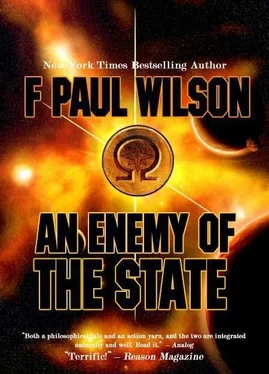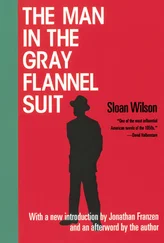“Must eat a whole lotta other fish to make it grow so big.”
“Actually it doesn't eat other fish at all.” He walked her closer to the huge mouth that split the head, their approach stirring up a flight of scale-winged keendars from their feast on the remains. “See those big plates of hairy bone along the upper jaw…looks like a comb? That's the sieve. As they swim along, these malaks strain sea water through their sieve and eat all the tiny animals they trap in the hairs. Mostly it's stuff called plankton.”
He let Laina down on the sand so she could run up for a closer look. She wasn't long-the stench from the cavernous maw was too strong to allow a leisurely inspection.
“What's plankton?” she asked as she returned to his side. “I never heard of that before.”
“Let's go back up on the dune where the smell isn't so bad and I'll tell you all about it.”
Hand in hand they plodded through the damp, yielding blue granules to a point overlooking the waterline, yet beyond the carcass's fulsome stench, and watched the screaming, circling keendars for a quiet moment.
“Still interested in plankton?” Receiving a nod, Peter spoke in a slow, almost reminiscent manner, gearing his explanation to a child's mind, yet keeping it up at a level where Laina would have to reach a bit.
“Plankton is the basic food of the sea. It's billions of tiny little creatures, some plants, some animals, but all very, very tiny. They gather in huge batches out at sea, some just drifting others wiggling a little whip-like arm called a flagellum to push them here and there.
“All they really do is live and die and provide food for most of the ocean. They probably think they know just where they're going, never realizing that all the time the entire plankton patch is being pushed about at the whim of wind and current. They get gobbled up by huge sieve malaks that can't see what they're eating, and the plankton don't even know they've been eaten till it's over and done with.”
“Poor plankton!” Laina said, concern showing in her face.
“Oh, they're happy in their own way, I suppose. And while the malaks are cutting huge swaths out of their ranks, they just go on whipping the old flagella about and having a grand time. Even if you tried to tell them of the malaks and other sea creatures that constantly feed off them, they wouldn't believe you.”
“How come you know so much about plankton?”
“I've studied it up close,” Peter said, thoughts of Earth flashing through his mind.
Laina eyed the long baleen combs on the malak's jaw. “Glad I'm not a plankton.”
“If I have my way,” Peter said, putting his arm protectively around his daughter, “you never will be.” He stood up and gave the inert leviathan one last look. “But it's nice to know that malaks die, too. Let's go. Your mother'll have the morning soup ready and we don't want cold soup.”
Backs to the ocean, they walked along the blue dune toward the house, wind spasms allowing a murmur or two of small talk to drift back to the beach where keendars were crying the sound that had given them their name and pecking morsels from the malak's landward eye, glazed and forever sightless.
“YOU'RE GOING BACK, aren't you,” Mora said as they sat in the Ancestor Grove under Peter's great-grandfather tree. He hadn't told her of his pre-dawn resolution to stay, and was glad. The light of day quickly revealed the many flaws in plans that had seemed so simple and forthright in the darkness. He had to go back. There was no other way.
“I must.” Leaning against the tree, a much larger version of Pierrot, gave him the strength to say it. On the day of his great-grandfather's death, a hole had been dug into the root ball of this tree and the coffinless remains interred there. Throughout the remainder of the following year, the tree had absorbed nutrients from the decomposing body, incorporating them into itself, growing taller on the unique organic fertilizer. The seeds that formed on the tree's branches the following spring were saved until the birth of the next LaNague child. And on that day, the day of Peter LaNague's birth, two of those seeds were planted-one in the Ancestor Grove, and one in an earthenware pot that would remain cribside as the child grew.
The Tolivian mimosa, it had been learned, possessed a unique ability to imprint on a human being. A seedling-called a misho -in constant exposure to a growing child will become attuned to that particular child, sensitive to and reflective of his or her moods. The art of branch and root pruning, necessary to limit the tree's size, is carefully taught as the child grows. Raising a child with a personal misho was a common practice on Tolive, but hardly universal. Mora's family considered it a silly custom and so she was never given her own tree, and now could never have one since codevelopment was necessary for imprinting. She could never understand the indefinable bond between her husband and Pierrot, nor the growing bond between Laina and her own misho , but she could see that it seemed to add an extra dimension to each of them and felt poorer for never having experienced it herself.
Peter looked at his wife in the midday light. She hadn't changed, not in the least. The deep, shining, earthy brown of her hair caught the gold of the Tolivian sun and flung it back. The simple shift she wore did little to hide the mature curves enclosed within. She appeared at ease as she reclined against him, but he knew that was a façade.
“The gloves ready?” he asked, making small talk.
“A hundred pairs. They've been ready for a long time.” She looked away as she spoke.
“And the coins?”
“Being minted as fast as possible. But you know that.”
Peter nodded silently. He knew. He had seen the reports around the house.
Mora was a supervisor at the mint. The star-in-the-ohm design was hers, in fact.
“You could still get out of it,” she said abruptly, twisting toward him. “I could. But would you want to live with me if I did?”
“Yes!”
“I don't think I'd be good company.”
“I don't care. You know how I feel. This revolution is all a huge mistake. We should just sit back and let them all rot. We've no obligation to them. They built the fire-let them burn!” Mora was not alone in her opinion; quite a few Tolivians were uncomfortable with the idea of fomenting a revolution.
“But we'll burn, too, Mora. And you know that. We've been over this a thousand times, at least. When the Imperium economy crumbles-and it's already started to-they'll go looking for ways to bolster the mark. The only way for a bankrupt economy to do that is to find a huge new market, or to confiscate a hoard of gold and silver and use it to make its currency good again. Tolive is known to be the largest hoarder of precious metals in Occupied Space. They'll come to us and they won't be asking, they'll be demanding-with the full force of the Imperial Guard ready to back up any threat they care to make.”
“With Flint on our side we could hold them off.” Mora said eagerly. “And then the Imperium will fall apart on its own. All we have to do is hold them off long enough!”
“And then what? With the Imperium gone, Earth will step in and take over the out-worlds without a single energy bolt being fired. With everything in chaos, Earth will act as if it's doing everyone a favor. But this time they'll make sure none of the out-worlds gets free again. This time they'll not allow maverick planets like Tolive and Flint to remain aloof. And with our own resources already drained by a drawn-out battle with the Imperium, we'll have no chance at all against the forces Earth will array against us. There must be a revolution now if there's to be a free Tolive for Laina.”
Читать дальше












